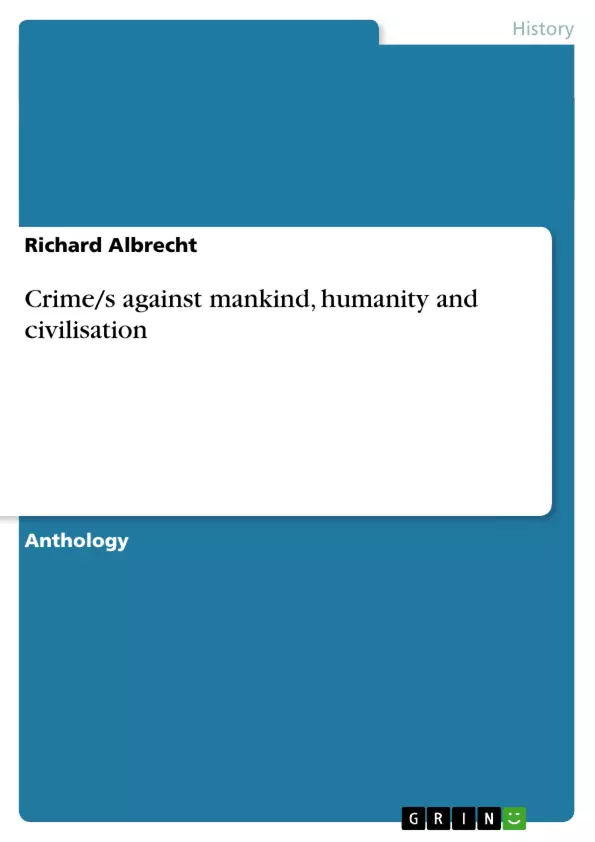Under the title „CRIME/S AGAINST MANKIND, HUMANITY, AND CIVILISATION“ which includes historical crimes as criminis magna against humanity and civilisation within the 20th century, the author, an experienced political scientist, and social psychologist, presents the grounded concept of his approach to what he identified as the three basic genocidal events during the World Wars in Europe: Armenocide, Serbocide, Holocaust.
The first essay is the printed version of Richard Albrechts paper which was delivered to the “Second International Meeting on Genocidal Social Practices” (November 20-24, 2007), at Universidad de Tres de Febrero, Buenos Aires, Argentinia, focussing on the continuity on Genocidal Social Practices including relevant aspects of preventing genocidal actions, too.
According to the printed version of this GRIN-booklet, Richard Albrecht wrote two specific appendices: (i) under the title “On Genocidal Affairs or What Had Happened” the author publishes three very short notes on what stayed in his mind, to be remembered by a productive anti-genocidal memory, as Ernst Bloch puts it, “which does not only remember what happened but also what still is to be done“; (ii) under the title “Murder(ing) Jews - secondly, academically, coldly …The “final solution” in Germany, 1941-45, as “realizing Utopia”: On the false world of a prominent German tenure-historian the author as scholarly as thoroughly reviews, as a radical critic, the long-living, and most effective, complete reversal (“Umwertung aller Werte” [Friedrich Nietzsche]) Hans Mommsen (*1930) did the last forty years in his various publications, which were – and are - widely accepted as legitimate contributions of a genocide scholar in that Gebilde named international “scientific community”.
Richard Albrechts booklet also presents the authors c.v. and short notes on the books the author published the last years, 2005-07.
Inhaltsverzeichnis (Table of Contents)
- Murder(ing) People
- Genocidal Policy Within 20th Century.
- Description, Analysis, and Prevention:
- Armenocide, Serbocide, Holocaust
- As Basic Genocidal Events During the World Wars*
- Nothing but a memory is productive which does not only remember what happened but also what still is to be done”
Zielsetzung und Themenschwerpunkte (Objectives and Key Themes)
The primary objective of this work is to present a comprehensive analysis of genocidal events during the 20th century, focusing on Armenocide, Serbocide, and the Holocaust. The author, an experienced political scientist and social psychologist, aims to provide a grounded theoretical framework for understanding these genocidal events and their interconnectedness.
- The nature of genocidal policy and its manifestation in different historical contexts.
- The role of ideology and racialized thinking in driving genocidal actions.
- The importance of recognizing and remembering genocidal events to prevent their recurrence.
- The need for a nuanced and critical approach to understanding and studying genocide.
- The relationship between historical events, such as the World Wars, and the escalation of genocidal violence.
Zusammenfassung der Kapitel (Chapter Summaries)
The text begins by introducing the concept of genocidal policy and its central role in the 20th century. The author emphasizes the importance of analyzing genocidal events within their historical context and the need for a holistic understanding of the motivations and mechanisms behind such actions.
The first chapter focuses on the Armenian genocide of 1915, providing an analysis of the political and social factors that contributed to this event. The author examines the role of the Young Turk government, the motivations behind the Armenian extermination, and the strategies employed by the perpetrators.
The second chapter delves into the Serbocide, a lesser-known genocide committed against the Serbs in Satellite Croatia during World War II. The chapter explores the historical context, the motivations behind the violence, and the role of the Ustase regime in perpetrating this atrocity.
The third chapter offers a comprehensive analysis of the Holocaust, focusing on the specific features and strategies employed by the Nazi regime in Germany. The author examines the role of ideology, anti-Semitism, and racialized thinking in driving the Holocaust, as well as the societal conditions that enabled this horrific event.
The text concludes with a discussion of the significance of recognizing and remembering genocidal events. The author underscores the importance of learning from the past to prevent future tragedies and the need for a strong commitment to justice and accountability.
Schlüsselwörter (Keywords)
Genocide, genocidal policy, Armenocide, Serbocide, Holocaust, World War I, World War II, Young Turks, Ustase, Nazi regime, anti-Semitism, racialized thinking, historical context, memory, prevention, justice, accountability.
Frequently Asked Questions
What are the three basic genocidal events discussed in this booklet?
The author focuses on the Armenocide, the Serbocide, and the Holocaust as the central genocidal events of the 20th century in Europe.
What is "productive anti-genocidal memory"?
Based on Ernst Bloch, it is a memory that not only remembers what happened but also focuses on what still needs to be done to prevent future genocides.
What is the "Serbocide"?
It refers to the genocide committed against Serbs in Satellite Croatia during World War II by the Ustase regime.
What is the author's critique of Hans Mommsen?
Richard Albrecht critically reviews Mommsen's historical interpretations of the "final solution," characterizing them as a reversal of values.
What role did ideology play in these genocides?
The work examines how racialized thinking and specific political ideologies (like those of the Young Turks or the Nazi regime) drove genocidal policies.
- Citar trabajo
- Dr. Richard Albrecht (Autor), 2007, Crime/s against mankind, humanity and civilisation, Múnich, GRIN Verlag, https://www.grin.com/document/84824



